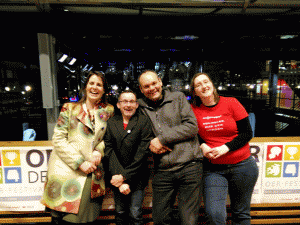Sehr nett – unsere Educational-App SnailWrite für iOS wurde von „Grundschullehrer Pete“ getestet. Das Video findet ihr hier.
[master] Practical Usage of OER Material in the EFL Classroom #tugraz
Maria did her masterthesis about the usage of Open Educational Resources in the Englisch-As-Foreign-Language Classroom. Her great outcomes can be seen in her slides of the defense of the masterthesis:
Klicken Sie auf den unteren Button, um den Inhalt von www.slideshare.net zu laden.
[publication] What Massive Open Online Course (MOOC) Stakeholders Can Learn from Learning Analytics? #tugraz
Our chapter about „What Massive Open Online Course (MOOC) Stakeholders Can Learn from Learning Analytics?“ got published as part of the International Compendium of Theory, Research, Practice, and Policy of Learning, Design and Technology.
Abstract:
Massive open online courses (MOOCs) are the road that led to a revolution and a new era of learning environments. Educational institutions have come under pressure to adopt new models that assure openness in their education distribution. Nonetheless, there is still altercation about the pedagogical approach and the absolute information delivery to the students. On the other side with the use of Learning Analytics, powerful tools become available which mainly aim to enhance learning and improve learners’ performance. In this chapter, the development phases of a Learning Analytics prototype and the experiment of integrating it into a MOOC platform, called iMooX will be presented. This chapter explores how MOOC stakeholders may benefit from Learning Analytics as well as it reports an exploratory analysis of some of the offered courses and demonstrates use cases as a typical evaluation of this prototype in order to discover hidden patterns, overture future proper decisions, and to optimize learning with applicable and convenient interventions.
[Draft Version @ ResearchGate]
Reference: Khalil, M., Ebner, M. (2016) What Massive Open Online Course (MOOC) Stakeholders Can Learn from Learning Analytics? In: Spector, M., Lockee, B., Childress, M. (Ed.), Learning, Design, and Technology: An International Compendium of Theory, Research, Practice, and Policy, Springer International Publishing, pp. 1-30
[publication] What is Learning Analytics about? A Survey of Different Methods Used in 2013-2015 #LearningAnalytics #tugraz
Our publication about „What is Learning Analytics about? A Survey of Different Methods Used in 2013-2015“ for this year Smart Learning Excellence Conference in Dubai is now online available. The slides have been already published here.
Abstract:
The area of Learning Analytics has developed enormously since the first International Conference on Learning Analytics and Knowledge (LAK) in 2011. It is a field that combines different disciplines such as computer science, statistics, psychology and pedagogy to achieve its intended objectives. The main goals illustrate in creating convenient interventions on learning as well as its environment and the final optimization about learning domain’s stakeholders (Khalil & Ebner, 2015b). Because the field matures and is now adapted in diverse educational settings, we believe there is a pressing need to list its own research methods and specify its objectives and dilemmas. This paper surveys publications from Learning Analytics and Knowledge conference from 2013 to 2015 and lists the significant research areas in this sphere. We consider the method profile and classify them into seven different categories with a brief description on each. Furthermore, we show the most cited method categories using Google scholar. Finally, the authors raise the challenges and constraints that affect its ethical approach through the meta-analysis study. It is believed that this paper will help researchers to identify the common methods used in Learning Analytics, and it will assist by establishing a future forecast towards new research work taking into account the privacy and ethical issues of this strongly emerged field.
[Full text @ ResearchGate]
Reference: Khalil, M., Ebner, M. (2016). What is Learning Analytics about? A Survey of Different Methods Used in 2013-2015. Conference proceeding of the 8th e-Learning Excellence Conference, 2016. Dubai, UAE. pp. 1-12
[imoox, coer] Online-Kurs zu Open Educational Resources (COER16) startet heute #coer16 #imoox #mooin
Es freut mich ganz besonders, dass nach dem COER13 und dem COER15 es wieder gelungen ist, den Online-Kurs zu Open Educational Resources zu starten. Wenig überraschend heuer unter dem Kürzel COER16. Und wir haben uns auch diesesmal wieder etwas überlegt – eine Weltpremiere (!). Erstmalig wird ein MOOC auf zwei Plattformen parallel durchgeführt und man kann sich je nach Lust & Laune entweder bei
Die Betreuung der beiden Kurse haben wir uns aufgeteilt, während Andreas Wittke und Anja Lorenz für das mooin-Team einspringen, machen es Sandra Schön und ich bei iMooX. Wir haben uns also viel überlegt und den Kurs gegenüber den Vorjahren doch entscheidend wieder erweitert und es kommen noch mehr Expertinnen und Experten zu Wort. Mehr wird aber nicht mehr verraten – mitmachen, erstellen, remixen, wiederverwenden, diese Worte sollen Sie einfach ab sofort immer begleiten 🙂 .

[presentation] Potential of EPUB3 for Digital Textbooks in Higher Education #ebook #tugraz
Mohammad Khalil also presented our publication about „Potential of EPUB3 for Digital Textbooks in Higher Education “ at Smart Learning Excellence Conference in Dubai. Here are his presentation slides:
Klicken Sie auf den unteren Button, um den Inhalt von de.slideshare.net zu laden.
[presentation] Digital Natives und die Welt von heute #tugraz #research
Im Rahmen des Antikorruptionstages des Bundesministeriums für Inneres bin ich gefragt worden über das Thema Digital Natives zu reden. Hier sind meine Folien dazu:
Klicken Sie auf den unteren Button, um den Inhalt von www.slideshare.net zu laden.
[lernvideo] Howto: Binär in Dezimal umrechnen #TEL #tugraz
Im Rahmen der Lehrveranstaltung „Technology Enhanced Learning“ ist die Aufgabe der Übungsarbeit ein Lernvideo zu erstellen. Eines der heuer erstellten Videos erkärt die Umrechnung von Dezimal- in Binärzahlen und umgekehrt:
[publication] Online-Lehre in der Weiterbildung? #tugraz #lll
Für die 10 Jahres Feier von TU Graz Life Long Learning habe ich auch einen kleinen Beitrag zur Rolle der Online-Lehre geschrieben und mir Gedanken gemacht, wie wesentliche die Digitalität vor allem auf diesem Sektor ist.
[Full Article on Researchgate]
Zitation: Ebner, M. (2015) Online-Lehre in der Weiterbildung?. Life Long Learning. Publikation anlässlich des 10-jährigen Bestehens von TU Graz Life Long Learning. Eigenverlag. S. 32-34
[gadi, imoox] Woche 4: Virtuelle Welten, Big Data und Netzpolitik #gadi16 #imoox

 Der MOOC „Gesellschaftliche Aspekte der Informationstechnologie“ auf iMooX geht schon in die vierte Woche. Diesesmal sind die Experten Patrick Schweighofer, Martin Gersch bzw. Hannes Rothe und Thomas Lohninger die uns in ihren Fachbereichen Einblicke geben werden.
Der MOOC „Gesellschaftliche Aspekte der Informationstechnologie“ auf iMooX geht schon in die vierte Woche. Diesesmal sind die Experten Patrick Schweighofer, Martin Gersch bzw. Hannes Rothe und Thomas Lohninger die uns in ihren Fachbereichen Einblicke geben werden.

Die Themen Virtuelle Welten, Geschäftsmodelle rund um Big Data und Netzpolitik beschäftigen uns bereits heute, aber werden wohl zukünftig noch viel wichtiger werden.
Also unbedingt vorbei schauen und mitdiskutieren – der Einstieg in den MOOC ist ebenso jederzeit möglich.
[Link zum Kurs]

